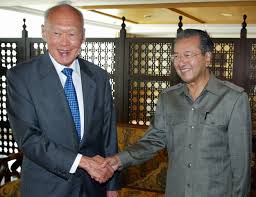Out of the shadows of Dr M and Kuan Yew
Lim Mun Fah, My Sinchew
There have been endless entanglements and disputes between Malaysia and Singapore over all these years, and former Malaysian prime minister Tun Dr Mahathir Mohamad and Singapore’s founding father Lee Kuan Yew played a key role in the bilateral relations of the two neighbouring countries.
In the era of Lee, Singapore’s leaders had a deep affection for Malaysia and it was closely related to their origins.
According to Lee, when he first formed the Cabinet in 1959, only two of the nine Cabinet ministers were born in Singapore and in 1982, except for one, all his senior ministers were not locally born.
Most board directors of statutory bodies were not locals, accounting for 71% in the 1960s and 61% in the 1980s.
Among its immigrants, 41% were from Malaysia and until today, Malaysians can still be found in its talent pool, such as its Minister for National Development Khaw Boon Wan, who is from Penang.
The people of Johor can feel such special ties between Malaysia and Singapore deeply.
Therefore, the call of Youth and Sports Minister Khairy Jamaluddin Abu Bakar that Malaysia and Singapore should move beyond treating each other as bogeymen and rivals has agreed by the people of Johor.
Khairy told a fact, namely when Malaysian politicians wanted to stir up national sentiment, they would take Singapore as a bogeyman; while the late Lee also liked to criticise Malaysia.
For instance, when Dr Mahathir raised the crooked bridge issue recently, he made some provocative remarks such as Malaysia should not bow to Singapore.
Meanwhile, Lee’s “Malaysians’ Malaysia” concept is still affecting Malaysians today. In his memoirs and books, Lee had repeatedly criticised Malaysia’s racial policies and asserted that if Tunku Abdul Rahman was firm enough to soothe the radicals, build a multiracial Malaysia, and let the Chinese and Indians share power in the police, army and administrative agencies, Malaysia will be more prosperous and fair than it is today.
“Much of what has been achieved in Singapore could have been replicated throughout Malaysia. Both countries would have been better off.”
Of course, it was not something nice to be heard for Umno leaders and some of them even accused Lee of distorting history and offending the late leader of Malaysia.
As far as I can remember, Lee had not lost even one lawsuit and he rarely apologised. An exception took place when he openly apologised to Malaysia under the pressure of public opinion for calling Johor Baru “a city notorious for shootings, muggings and carjackings” in an affidavit for a libel case against his political rival Tang Liang Hong in March 1997.
Lee and Dr Mahathir are both controversial leaders and they called each other racist. In fact, they are quite similar in terms of personalities and style.
For instance, they left the office but never retire. Instead, they kept criticising their successors, political opponents and even allies. They are both tough and do not compromise easily in politics.
From splitting, merging to separation, Malaysia and Singapore had enjoyed the era when the countries used the same currency and their people were free to cross borders without passports; as well as encountered times of disputes over airspace, water, provident funds, KTM land rights and sovereignty of Pedra Branca.
It is undeniable that many of these disputes involved Dr Mahathir and Lee and each battle between the two strongmen had decided the direction of the bilateral relations.
In the post-Lee and post-Dr Mahathir era, Malaysia and Singapore, after all, need to get rid of their shadows and open up a new pattern. It is the people’s will to coexist and be friends for generations.


